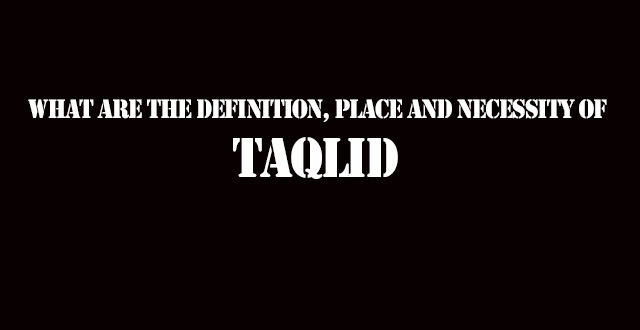
In verse 23 of Suratul Nisa, we read:
حُرِّمَتْ عَلَيْكُمْ أُمَّهَاتُكُمْ وَ بَنَاتُكُمْ وَ أَخَوَاتُكُمْ وَ عَمَّاتُكُمْ وَ خَالاَتُكُمْ وَ بَنَاتُ الأََخِ وَ بَنَاتُ الأُُخْتِ وَ أُمَّهَاتُكُمُ اللاَّتِي أَرْضَعْنَكُمْ وَ أَخَوَاتُكُمْ مِنَ الرَّضَاعَةِ وَ أُمَّهَاتُ نِسَائِكُمْ وَ رَبَائِـبُكُمُ اللاَّتِي فِي حُجُورِكُمْ مِنْ نِسَائِكُمُ اللاَّتِي دَخَلْـتُمْ بِهِنَّ فَإِنْ لَمْ تَكُونُوا دَخَلْتُمْ بِهِنَّ فَلاَ جُناحَ عَلَيْكُمْ وَ حَلاَئِلُ أَبْنَائِكُمُ الَّذِينَ مِنْ أَصْلاَبِكُمْ وَ أَنْ تَجْمَعُوا بَيْنَ الأُُخْـتَيْنِ إِلاَّ مَا قَدْ سَلَفَ إِنَّ اللٌّهَ كَانَ غَفُوراً رَحِيماً
“Forbidden to you are your mothers and your daughters and your sisters and your paternal aunts and your maternal aunts and brothers’ daughters and sisters’ daughters and your mothers that have suckled you and your foster-sisters and mothers of your wives and your step-daughters who are in your guardianship, (born) of your wives to whom you have gone in, but if you have not gone in to them, there is no blame on you (in marrying them), and the wives of your sons who are of your own loins and that you should have two sisters together, except what has already passed; surely Allah is Forgiving, Merciful.”
The question that arises here is: What is the philosophy behind the prohibition of marriage with one’s maharim?
In this verse allusion has been made towards the maharim – meaning the ladies with whom marriage is forbidden – and on the basis of it, we can conclude that there are three ways by which this relationship can come into existence:
1. By birth – This is referred to as ‘genealogical relationship’.
2. By matrimony – This is referred to as ‘causal relationship’
3. By suckling – This is referred to as ‘foster relationship’
Foremost, alluding to the maharim by birth, who constitute seven groups, the verse says:
حُرِّمَتْ عَلَيْكُمْ أُمَّهَاتُكُمْ وَ بَنَاتُكُمْ وَ أَخَوَاتُكُمْ وَ عَمَّاتُكُمْ وَ خَالاَتُكُمْ وَ بَنَاتُ الأََخِ وَ بَنَاتُ الأُُخْتِ
“Forbidden to you are your mothers and your daughters and your sisters and your paternal aunts and your maternal aunts and brothers’ daughters and sisters’ daughters.”
It should be noted that the term ‘mother’ does not intend only the lady, who directly gives birth to a person but also includes the paternal and maternal grand-mothers and great grand-mothers. Similarly, ‘daughter’ does not mean the direct daughter only, but also includes the grand-daughters and the great grand-daughters, and similarly so with the other five groups.
Even though unsaid, it is clear that all the people (except for a very few), experience a sense of revulsion and reprehension towards such a marriage, and even the Magi, who in their ancient books have permitted these marriages, today reject them.
Although there are some people who strive to present the issue as one having its origins in an ancient habit and custom, it should be borne in mind that a habit or a custom can never be eternal and universal, for we know that if a law is found to exist universally amongst all the individuals of the human species and all throughout the ages, it generally reveals that the law is in conformity and agreement with the innate nature of man.
Apart from this, today the reality has been established that marriage between consanguineous individuals entails numerous dangers such as manifestation and aggravation (not generation) of latent and hereditary diseases. There are some people who, apart from the maharim, do not even approve of marriages between relatively distant relations, such as first cousins, and are of the opinion that such alliances tend to accentuate the dangers of hereditary diseases.25 Nevertheless, if this issue does not create problems with respect to distant relatives (and usually it does not), it is surely bound to create problems with respect to the immediate relatives, amongst whom the ties of consanguinity are more intense.
Besides, generally there does not exist a sexual attraction and appeal amongst the maharim, since they mostly grow up together and thus appear common and ordinary to each other – rare and exceptional cases cannot form the criterion for general and universal laws – and we know that the existence of sexual attraction is a condition for the consolidation of a matrimonial alliance. Thus, if marriage were to take place between the maharim this alliance would be weak and unstable.
Then the Qur`an mentions the maharim that come into existence by way of suckling, and says:
وَ أُمَّهَاتُكُمُ اللاَّتِي أَرْضَعْنَكُمْ وَ أَخَوَاتُكُمْ مِنَ الرَّضَاعَةِ
“…And your mothers that have suckled you and your foster-sisters.”
Although the Qur`an, in this portion of the verse, has only mentioned two groups from this category – the mothers and the sisters -according to numerous traditions, those who become maharim as a result of suckling are not confined to these two groups only. The well-known tradition of the Noble Prophet (s.a.w) states:
يَحرَمُ مِنَ الرِّضاَعِ ماَ يحَرَمُ مِنَ النَّسَبِ.
“All those, who become prohibited by means of genealogy, also become prohibited by means of suckling.”
Of course, there are numerous details and particulars associated with the measure of milk-feed and the manner and conditions of feeding (the child) which bring about this relationship, and these have been mentioned in books of jurisprudence.
The philosophy behind prohibiting marriage with such maharim is that the bones and flesh of the child develop as a result of the milk of the person and subsequently, the child comes to develop a resemblance with the (actual) children of the person. For example, if a woman suckles a child in a measure that its body develops and grows as a result of her milk, a kind of resemblance comes into existence between this child and the other (real) children of the woman. In reality, each of them come to be regarded as a part of the woman and are like brothers who are related by birth.
In the final phase the Qur`an, alluding to the third kind of maharim, classifies them into three categories:
a) …and mothers of your wives. As soon as the formula of marriage is recited and a woman gets married to a man, her mother, grand mother etc, all become eternally prohibited for the man.
b) …and your step-daughters who are in your guardianship, (born) of your wives to whom you have gone in. Just a mere recitation of the marriage formula does not make the woman’s daughters, obtained from a previous husband, prohibited for the husband – rather, the condition is that in addition to the recitation of the formula, the marriage should also be consummated. The presence of this condition in this case endorses the fact that the ruling in the case of the wife’s mother, mentioned in the previous sentence, is not bound by this condition, and technically speaking, it strengthens the general nature of that ruling.
Although, apparently, the condition:
فِي حُجُورِكُمْ.
“…in your guardianship” gives the impression that if the woman’s daughter, borne from a previous husband, is not brought up by the husband, she is not forbidden for him, however, from the context of the traditions and the incontrovertibility of the ruling, it can be concluded that this condition is not, technically speaking, a precautionary condition but rather a pointer towards the reason for this prohibition.
This is because such daughters, whose mothers embark upon a new marriage, are usually young in age and are mostly brought up under the care of the new husbands as if they were their own daughters. The verse states: These are, in reality, similar to your own daughters. Does a person ever marry his own daughter? The selection of the word رَباَئِب which is the plural form of رَبِيبَة -meaning ‘the one brought up’ – is also for this very reason.
Pursuant to this part, the verse, for emphasizing the issue, adds: if you have not engaged in sexual intercourse (with the woman) her daughters are not forbidden for you:
فَإِنْ لَمْ تَكُونُوا دَخَلْتُمْ بِهِنَّ فَلاَ جُناحَ عَلَيْكُمْ
c) …and the wives of your sons who are of your own loins. In reality, the expression مِن اَصلاَبِکُم (of your own loins) has been employed so as to annul an incorrect custom of the Era of Ignorance. In those days it had been a common practice to select individuals and adopt them as one’s own sons; the people would adopt an individual, who was someone else’s son, as their own son and all the rulings that were associated with a real son would come to be associated with this adopted son. Accordingly they never married the wives of their adopted sons. In Islam, adoption and all the rulings (of the Age of Ignorance) associated with it have been regarded as totally baseless.
d) …and that you should have two sisters together i.e., marrying two sisters, at one time, is not permissible. Thus, there is no harm in marrying two or more sisters if the marriages were to take place at different times and after being separated from the previous sister.
Since it had been a common practice to take two sisters as wives at the same time and there were individuals, who had entered into such marriages, the Qur`an, after the abovementioned sentence, says:
إِلاَّ مَا قَدْ سَلَفَ
…except what has already passed…; i.e. those, who have entered into such marriages before the revelation of this law shall not face chastisement, however they would now have to select and keep one of the two and leave the other.
The secret behind the prohibition of such marriages by Islam could be that two sisters, due to their genealogy and natural attachment, possess intense fondness for each other, however when they become rivals they are not able to preserve and maintain the former affection for each other and consequently, a kind of emotional conflict manifests within them, which is detrimental for them. This is because the impulse of ‘affection’ and that of ‘rivalry’ are in a state of perpetual conflict within them.










